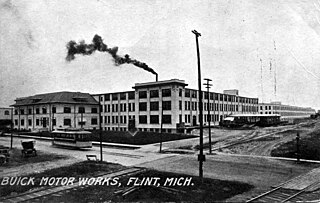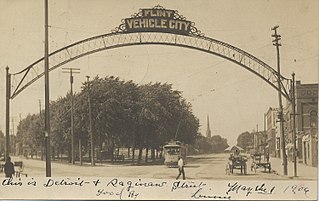Related Research Articles

General Motors (GM) is an American multinational automotive manufacturing company headquartered in Detroit, Michigan, United States. The company is most known for owning and manufacturing four automobile brands, Chevrolet, GMC, Cadillac and Buick. By sales, it was the largest automaker in the United States in 2022, and was the largest in the world for 77 years before losing the top spot to Toyota in 2008.

Roger & Me is a 1989 American documentary film written, produced, directed by, and starring Michael Moore, in his directorial debut. Moore portrays the regional economic impact of General Motors CEO Roger Smith's action of closing several auto plants in his hometown of Flint, Michigan, reducing GM's employees in that area from 80,000 in 1978 to about 50,000 in 1992. As of August 2015, GM employs approximately 7,200 workers in the Flint area, according to The Detroit News, and 5,000 workers according to MSNBC.

The 1936–1937 Flint sit-down strike, also known as the General Motors sit-down strike, or the great GM sit-down strike, was a sitdown strike at the General Motors plant in Flint, Michigan, United States. It changed the United Automobile Workers (UAW) from a collection of isolated local unions on the fringes of the industry into a major labor union, and led to the unionization of the domestic automobile industry.

The United Auto Workers (UAW), fully named International Union, United Automobile, Aerospace and Agricultural Implement Workers of America, is an American labor union that represents workers in the United States and southern Ontario, Canada. It was founded as part of the Congress of Industrial Organizations (CIO) in the 1930s and grew rapidly from 1936 to the 1950s. The union played a major role in the liberal wing of the Democratic Party under the leadership of Walter Reuther. It was known for gaining high wages and pensions for automotive manufacturing workers, but it was unable to unionize auto plants built by foreign-based car makers in the South after the 1970s, and it went into a steady decline in membership; reasons for this included increased automation, decreased use of labor, mismanagement, movements of manufacturing, and increased globalization. After a successful strike at the Big Three in 2023, the union organized its first foreign plant (VW) in 2024.

Harlow Herbert Curtice was an American automotive industry executive who led General Motors (GM) from 1953 to 1958. As GM's chief, he was selected as Man of the Year for 1955 by Time magazine.

Interstate 475 (I-475) is a north–south auxiliary Interstate Highway in the US state of Michigan. I-475 is a 16.9-mile (27.2 km) bypass route that serves the downtown area of Flint while its parent, I-75, passes through the west side of the city. I-475 starts southwest of Grand Blanc and runs through suburbs of Flint before passing through downtown. There, it intersects I-69 and crosses the Flint River. The freeway turns westerly to connect back to I-75 north of Flint near Mount Morris.

The Dort Motor Car Company of Flint, Michigan, built automobiles from 1915 to 1924.

Buick City was a massive, vertically-integrated automobile manufacturing complex in northeast Flint, Michigan, which served the Buick home plant between 1904 and 1999. In the early 1980s, after major renovations were completed to better compete with Japanese producers, the plant was renamed to "Buick City".
Pontiac East Assembly was a General Motors manufacturing facility located in Pontiac, Michigan. The manufacturing complex at 2100 South Opdyke Road occupied a rectangular 162-acre site directly east of the GM Pontiac Centerpoint Complex. Hourly workers were represented by UAW Local 594.
Delco Electronics Corporation was the automotive electronics design and manufacturing subsidiary of General Motors based in Kokomo, Indiana, that manufactured Delco Automobile radios and other electric products found in GM cars. In 1972, General Motors merged it with the AC Electronics division and it continued to operate as part of the Delco Electronics division of General Motors. When the corporation acquired the Hughes Aircraft Company, Delco was merged with it to form Hughes Electronics as an independent subsidiary.

Owen Frederick Bieber was an American labor union activist. He was president of the United Auto Workers (UAW) from 1983 to 1995.

Flint, Michigan is a city which previously relied on its automotive industry, and still does to an extent. Over the past several decades, General Motors plants in Genesee County have experienced re-namings, management shifts, openings, closures, reopenings, and spinoffs.

The history of General Motors (GM), one of the world's largest car and truck manufacturers, dates back more than a century and involves a vast scope of industrial activity around the world, mostly focused on motorized transportation and the engineering and manufacturing that make it possible. Founded in 1908 as a holding company in Flint, Michigan, as of 2012 it employed approximately 209,000 people around the world. With global headquarters at the Renaissance Center in Detroit, Michigan, United States, General Motors manufactures cars and trucks in 35 countries. In 2008, 8.35 million GM cars and trucks were sold globally under various brands. Current auto brands are Buick, Cadillac, Chevrolet, GMC, Baojun, and Wuling. Former GM automotive brands include LaSalle, McLaughlin, Oakland, Oldsmobile, Opel, Pontiac, Hummer, Saab, Saturn, Vauxhall, Daewoo, and Holden.
The 2007 General Motors Strike was a labor union strike that lasted three days from September 23 to September 25, 2007, organized by the United Auto Workers (UAW) union. The UAW were engaged in talks with General Motors (GM) to negotiate a new labor contract but were unable to come to an agreement before the deadline. Consequently, 73,000 workers walked out forcing 80 GM facilities in 30 states to cease operations. After the two day strike, the two parties reached an agreement in which the UAW union would assume the responsibility for managing retiree healthcare liabilities. The UAW previously went on strike against General Motors in 1970.
ACDelco is an American automotive parts brand owned by General Motors (GM). Factory parts for vehicles manufactured by GM are consolidated under the ACDelco brand, which also offers aftermarket parts for non-GM vehicles. Over its long history it has been known by various names such as United Motors Corporation, United Motors Service, and United Delco. The brand "ACDelco" should not be confused with GM's former AC Delco Systems, formed in 1994 from the merger of AC Rochester Division and Delco Remy Division. In 1995 Delphi Automotive Systems absorbed AC Delco Systems.

Robert Thompson King is an American lawyer and labor union activist and leader. He was elected President of the United Auto Workers (UAW) on June 15, 2010. His term of office ended in June 2014, and King announced his retirement, being succeeded by Dennis Williams as head of the UAW.

Victor George Reuther was a prominent international labor organizer. He was one of three Reuther brothers who were lifelong members of the U.S. labor movement. His older brother Walter became the president of the United Auto Workers union (UAW) and Victor became the head of that union's Education Dept. and an organizer on the international level. He was a proponent of social democracy.
The tool and die strike of 1939, also known as the "strategy strike", was an ultimately successful attempt by the United Auto Workers Union (UAW) to be recognized as the sole representative for General Motors workers. In addition to representation rights, the UAW, working jointly with the Congress of Industrial Organizations (CIO), sought to resolve existing grievances of skilled workers.
The W.F. Stewart Company was an American carriage body and automotive body manufacturer founded in 1881 by William Francis Stewart and based in Flint, Michigan. The company specialized in the design and manufacture of wooden carriage bodies for horse-drawn transport and later automotive bodies. The company also briefly produced light aircraft, but went out of business in the Great Depression.
The 2019 General Motors strike began September 15, 2019, with the walkout of 48,000 United Automobile Workers from some 50 plants in the United States. Demands by workers included increased job security, gateway for temporary workers to become permanent, better pay and retaining healthcare benefits.
References
- 1 2 "Family to return to Flint East". Detroit Free Press . Archived from the original on September 29, 2007. Retrieved June 22, 2007.
- ↑ "Delphi Flint East, former AC Spark Plug building bought for $3.15 million". mlive. 2017-10-02. Retrieved 2019-12-29.
- ↑ "Engineering center at Delphi East to close, jobs moving to Auburn Hills". Flint Journal . Retrieved April 17, 2007.
- ↑ "Sloan Museum traces Flint's rich automotive history". The Detroit News . Archived from the original on July 12, 2012. Retrieved April 17, 2007.
- ↑ "GM Corporate History". Archived from the original on June 10, 2011. Retrieved April 17, 2007.
- ↑ "The 1998 Flint-GM strike - Bellwether of continental integration and lean production" (PDF). Babson, Steve. Archived from the original (PDF) on May 6, 2004. Retrieved April 17, 2007.
- ↑ "Delphi workers get choices". Detroit Free Press . Archived from the original on September 26, 2007. Retrieved June 24, 2007.
- ↑ "Faience Tile to be auctioned for United Way". The Flint Journal . Retrieved August 1, 2007.[ dead link ]
